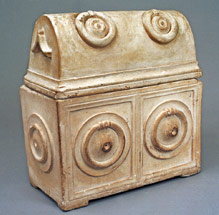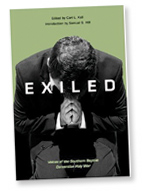BaptistWay Bible Series for January 14: Practice love beyond the limits
Posted: 1/08/07
BaptistWay Bible Series for January 14
Practice love beyond the limits
• John 13:1-17, 34-35
By David Wilkinson
Broadway Baptist Church, Fort Worth
Our church has a wonderful tradition that occurs during the ordination service for deacons. Each new deacon is presented a white hand towel as a symbol of the ministry to which he or she has been called. The towel is a tangible reminder of the spirit of Jesus, who took a towel and a basin of water to wash the feet of his disciples as described in John 13.
In reading John 13 again, it occurred to me that the “towel of servanthood” could appropriately be presented to every believer who declares his or her commitment to follow Jesus.
Farewell address
Chapter 13 marks a new section in John’s Gospel. The first 12 chapters have been devoted to a description of Jesus’ public ministry. Now, the Gospel writer deliberately slows the pace in order to focus on one evening in the life of Jesus centered around what Christians through the ages have called the Lord’s Supper.
The Gospel writer devotes five chapters to what could be called Jesus’ farewell address to his disciples. In contrast, Mark records what Jesus said and did at the Last Supper in nine short verses. This address, however, is not literally a single discourse but a collection of speeches and conversations the writer has assembled around the event of the Last Supper. He seems to assume familiarity on the part of his readers with the Lord’s Supper and makes no mention of the crucial words of institution.
The significance of the occasion is emphasized in the chapter’s opening verse. Throughout the first 12 chapters, the narrative has made repeated references to Jesus’ sensitivity to God’s will and timing in his life. In response to external pressures that would have thrown him off course in terms of his God-given mission, Jesus responded that his “hour” or “time” had not yet come (2:4; 7:6, 8; 8:20). At other times, he spoke of the “hour” that was still to come (4:21, 23; 5:25, 28).
Now, however, Jesus affirms the “hour” has arrived. In what other Gospel writers referred to as “the fullness of time,” the moment has come “for the Son of man to be glorified” (12:23). The time has come for Jesus “to depart from this world and go to the Father” (13:1). But Jesus also recognizes it is a time that will bring great agony and indescribable suffering, and his “soul is troubled” (12:27).
Larger audience
Chapter 13 introduces a shift in another sense as well. In the description of Jesus’ public ministry in chapters 1-12, we readers are observers; we are onlookers who “overhear” the words and actions of Jesus through the narrative.
Now, however, the audience shifts. In chapters 13-17, the crowds and Jesus’ opponents disappear from the scene. Jesus is alone with his inner circle and speaks directly to them. In terms of the writer’s larger purpose, however, this farewell address has been compiled to speak to the church.
More than the synoptic Gospels, the Gospel of John addresses the first major crisis for the fledgling church—the departure of Jesus. Yes, Jesus has been raised, and he has returned to his Father, just as he had promised. That is the good news, and as we shall see, one of the central themes of Jesus’ farewell discourses is that the disciples will not be left alone; they will be given the Holy Spirit to guide and empower them.
But in the weeks and months following Jesus’ ascension, the disciples were faced with the unsettling reality that they faced an uncertain future without the daily, physical presence of Jesus. How are they to proceed? What are they to do to carry out Jesus’ mission in the world?
These five chapters anticipate such questions. Having “loved them to the end” (13:1), Jesus now prepares the disciples for what lies ahead.
Radical humility
With echoes of the prologue’s description in the background, the One who “had come from God and was going to God” (v. 3) does something astonishing. The poignancy of the moment is underscored by the deliberate contrast between Jesus’ awareness of his authority (“knowing that the Father had given all things into his hands,” v. 3) and the deep humility of his actions. He removes his robe, wraps a towel around his waist, fills a basin with water and begins to wash the disciples’ feet (vv. 4-5).
His actions, amplified by the subsequent exchange with Peter (vv. 6-11) and then interpreted by Jesus (vv. 12-20), are at one level a lesson in humility and servanthood. But they are much more than that, and we, like Peter, miss the point if we go no further.
To wash another’s feet, dirty from traveling in sandals on dusty roads, was a menial task not required even of Jewish slaves. It is this kind of self-abasement or humiliation to which Peter objects. Indeed, this simple act of “humiliation” is soon to be followed by the ultimate humiliation of a brutal execution on a Roman cross—events that only later Peter and the other disciples will come to understand (v. 7). Furthermore, this course of events is something the Son of God deliberately chooses out of love.
In the poetic hymn the Apostle Paul incorporated into his letter to the church in Philippi, Christians are called “in humility (to) regard others as better than yourselves” and to adopt the spirit of Christ Jesus, “who, though he was in the form of God, did not regard equality with God as something to be exploited, but emptied himself, taking the form of a slave … he humbled himself and became obedient to the point of death—even death on a cross” (Philippians 2:6-8).
With Peter and all would-be followers, this life of radical self-sacrifice is something we are invited to share with Jesus: “For I have set an example that you also should do as I have done to you” (v. 14). I can almost see Jesus rise to his feet, hand me the towel, and say, “OK, now it’s your turn.”
Discussion questions
• Madeleine L’Engle recounts a story of a student who went to a famous old rabbi with a question: “Master, in the old days there were people who could see God. Why is it that nobody sees God nowadays?” The rabbi answered, “My child, nowadays nobody can stoop so low.” L’Engle then asks, “Why are we afraid of stooping so low? Didn’t the second person of the Trinity stoop lower than we can even conceive when he willingly relinquished all power and glory to come to earth as a human baby?” How would you answer L’Engle’s question?
• What are some concrete ways you have seen Christians live out the spirit of Jesus’ example of washing the disciples’ feet?
News of religion, faith, missions, Bible study and Christian ministry among Baptist churches, in Texas, the BGCT, the nation and around the world.



